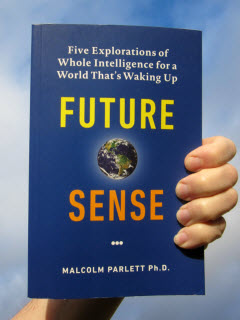This is a post in my organizing “between and beyond” series. Other posts are here. The purpose of this post is to reflect on Interrelating, which is one of Malcolm Parlett’s Five Explorations1 of Whole Intelligence2 in Future Sense. Here is my review of the book.

Future Sense by Malcolm Parlett
Background
Interrelating is the second of Malcolm Parlett’s Five Explorations.3 It is an extension of Responding to the Situation, which I have written about here.
Objectives
The aim of Interrelating is FRIENDSHIP. Enmity is its opposite. When communication breaks down, human suffering is often the result.4
Situations
The situations specifically have to do with our relating together.5
Interrelating
The impact of Whole Intelligence is perhaps experienced most vividly in our Interrelating.6 The quality of our Interrelating is not something that just happens.7 Reporting the truth of one’s own experience can improve the relating. Short statements are better than long ones. And questions must be based on genuine interest.8
Inevitably, exploring Interrelating occurs best through living study of our relating with others. Willingness is needed to meet the other will all our human fullness.9 The needs organizing our responding often remains unspoken.10 The space between people is often taken-for-granted.11 A more complete view of Interrelating reveals that:12
- Encounters are influenced by their contexts.
- Encounters are co-created dances. Reading each other’s intentions, seeking to move together, is unconscious, automatic and basic.
- We are more connected and mutually dependent than is generally assumed. We cannot exist entirely autonomously and still survive.
Recognizing what’s happening in our Interrelating changes it. Standing back makes it possible to see the bigger picture, and to realize our own contribution to the established patterns of communication.13
The joining of energy between people is a powerful phenomenon which needs to be appreciated and understood. Life would not go on without our meeting, collaborating, and engaging with one another. Organizing is possible because we are skilled in relating with each other, finding ways of connecting and re-connecting. We largely take these webs of collaboration for granted.14
What arises between us has many unconscious influences which powerfully shape our relationships. Attention to improving relationships is often directed too much on the individual. We are acting under many influences, like hidden pressures, traditions, and history.15
The taken-for-granted view of people as fundamentally separate has gone on unchallenged for so long. There is a need to move on from that outdated picture.16 The splitting of human beings into us and them is a fantasy picture.17 The more detached and different they seem to be, the easier it becomes to regard them as dangerous or unimportant.18
It is within our power to change our mindset, if not globally, at least locally. There are several possible steps:19
- We can speak up for less polarization. Connection is made through respecting each other’s individuality, exploring similarities and differences in a spirit of mutuality and curiosity.
- We can celebrate, uphold and treasure our diversity and multiplicity. We are all distinctive and can offer unique outlooks. Valuing individuality is not the same as Individualism. The bias towards reinforcing individualism and inequality leads to increased isolation. The emphasis on separation and competition divides the world.
- We can shift from narrow to more inclusive identifications. An affiliation with humanity-at-large is growing.
Incompatibilities
Individualistic assumptions, which are dominant in general thought, lead to dangerous simplifications.20 Individuals are interwoven with their situations. Just as there is an unmeasurable intelligence in an ecosystem, there is an intelligence at work between human beings. The idea of a shared relational field is useful and revealing.21 Maybe the shared relational field is more than a metaphor?22
Malcolm Parlett realizes that his view stretches people’s thinking. It has taken him years to redraw the lines of his own thinking.23 Notably in dancing, or in dialogue, there arises a situation where all are in one unit, while each person retains his or her own individual awareness.24 Ecosystems operate as working totalities. Likewise, the totality of the group as a whole need to be recognized.25
Conclusions
We are interconnected and interdependent. We cannot exist otherwise. We are also impacted by the entire collective context in which we exist. We both need to value our individuality and to identify with humanity at large. Our survival rests on achieving unparalleled levels of collaboration and cooperation. The learning never stops.
Notes:
1 Malcolm Parlett, Future Sense: Five Explorations of Whole Intelligence for a World That’s Waking Up (Matador, 2015), pp. 27–54.
2 Ibid., pp. 9, 16–21, 27, 86.
3 Ibid., p. 90.
4 Ibid..
5 Ibid..
6 Ibid., p. 91.
7 Ibid., p. 94.
8 Ibid., p. 95.
9 Ibid., p. 98.
10 Ibid., p. 99.
11 Ibid., p. 100.
12 Ibid., pp. 101–102.
13Ibid., p. 110.
14Ibid., p. 111.
15Ibid., p. 113.
16Ibid., p. 118.
17Ibid., pp. 123–124.
18Ibid., p. 124.
19Ibid., pp. 126–132.
20 Ibid., p. 103.
21 Ibid., p. 104.
22 Ibid., p. 106.
23 Ibid., p. 104.
24 Ibid., p. 105.
25 Ibid., p. 106.
Related posts:
Organizing in between and beyond posts
Responding to the situation
Leave a Reply
You must be logged in to post a comment.